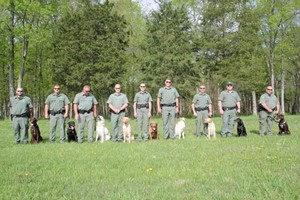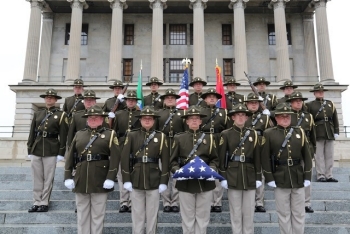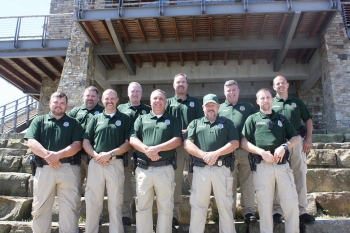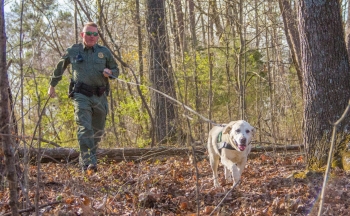TWRA Law Enforcement Support Programs
The TWRA Honor Guard is a team formed by wildlife officers throughout the state. The mission of the team is to represent the agency and honor the officer when he/she is killed in the line of duty, dies on duty, or is a retired officer who passes away.
Some of the ways officers are honored can include team members assisting the families left behind with funeral planning, Honor Guard presence during visitation/funeral services, and other customary services bestowed upon fallen law enforcement officers.
While the team may be called to assist with ceremonial services such as the presentation of the colors occasionally, their primary mission is to honor the life of fallen wildlife officers, both active and retired, and to support their families for the sacrifices the officer has made throughout their career.
If you have any questions about the program, please contact Lieutenant Tanner Romsdale.
In 2014, the TWRA formed a chaplain program with a primary focus on its commissioned law enforcement officers. While the program focuses on TWRA officers, it also provides services to other TWRA employees, as well as other law enforcement agencies and the public.
Chaplains have been a part of military history since 1775, when they were recognized by the U.S. government, and have served in every U.S. war since the American Revolution. Similar to the U.S. military, the TWRA chaplain program is based on three basic tenets: Nurture the living. Care for the wounded. Honor the dead.
This voluntary, faith-based, peer-supported program is designed to provide wildlife officers with an additional option for meeting their emotional and spiritual needs. Wildlife officers are called on to respond to incidents that involve death, victim rescue, victim recovery, or notification of next of kin. They also respond to natural or manmade disasters, which puts them on the front line to see and experience additional stress.
TWRA chaplains build resiliency by preparing the officer for his/her job and by strengthening the officer and his/her family. The chaplains are trained to bring hope and strength to those who have been wounded or traumatized in body, mind, or spirit by assisting the healing process.
They also participate in memorial ceremonies, services, and funerals, which place emphasis on the worth and value of the individual. The TWRA chaplain program is another tool to keep our officers safe and fit for duty.
If you have any questions about the program, please contact Sgt. Leith G. Konyndyk.
Region 1
Wildlife Officer Jared Poore, 629-207-0687, Jared.Poore@tn.gov
Greg Barker Lt. (Ret.) (Volunteer), 731-418-2073, gregbarker923@gmail.com
Region 2
Wildlife Sgt. Nathan Karch, 615-571-0329, Nathan.Karch@tn.gov
Wildlife Lt. Tanner Romsdal, 615-522-8305. Tanner.Romsdal@tn.gov
Wildlife Lt. David Robertson, 615-804-7326, David.H.Robertson@tn.gov
Region 3
Wildlife Officer Colt Elrod, 629-266-1223, Colt.D.Elrod@tn.gov
Wildlife Sgt. Andrew Ward, 423-936-6773, Andrew.Ward@tn.gov
Region 4
Wildlife Officer Caleb Hardwick, 629-266-1252, William.C.Hardwick@tn.gov
Wildlife Sgt. Jeff Roberson, 615-440-2217, Jeff.S.Roberson@tn.gov
Region 5
Glenn Moates Lt. Col. (Ret.) (Volunteer), 615-680-4956, glennmoates7@gmail.com
Sally Moates (Volunteer), 615-574-5845, smoates777@gmail.com
Statewide Chaplain Coordinator
Wildlife Sgt. Leith G. Konyndyk, 615-339-3694, leith.konyndyk@gmail.com, frogkon@gmail.com
K 9 Program
TWRA’s K-9 Program was launched in 2005 when wildlife officers Ken Cutsinger and Amy Snider attended the Kentucky Department of Fish and Wildlife Resources K-9 academy for a 10-week training course. Their Labradors, Macey and Jake, were almost 2 years old, and both dogs had been donated to help TWRA’s fledgling K-9 program get off the ground.
By 2007, the program had grown to seven teams across the state.
How We Train and Use the Dogs
Each officer in the program is responsible for finding her/his own dog and training them in basic obedience. TWRA uses the retriever breed because of its drive and friendly disposition. These dogs have a good nose, and hunters can relate to them.
The dogs have to be 1-year-old, but not over 2, to begin the training. The K-9 teams go through an intensive 10-week academy. They train and assess the dog's and handler's ability to work together. In this academy, dogs are trained to locate hidden wildlife, firearms, shell casings, and the ability to track humans.
The training is designed to test the dog’s ability and drive, to do this demanding work in various conditions and environments. The handlers train with the dogs in order to learn how to read them. This creates a special bond between the dog and the handler. No two dogs work the same, even though they go through the same training.
Once the teams have finished the academy, they return to their districts. K-9 teams provide the officers in their districts with another tool to be able to stop poaching. In the past years, K-9 teams across the state were involved in hundreds of cases. They have been used to find hidden game and guns, also to find shell casings in road hunting and spotlighting cases.
They are also used to find lost hunters and hunters who have tried to hide from officers. Because of their unique abilities, state and local law enforcement agencies often request them to find evidence in their cases and to assist in locating missing persons.

K-9 teams are also used in educational programs across the state. Each year, they make over 10,000 contacts with kids and adults. They are requested to do school programs, hunter safety classes, civic programs and are always a big attraction at outdoor trade shows and TWRA events. The K-9s are conditioned to be around people which allows the public a unique opportunity to interact with the dogs.
Where we use the Dogs
TWRA has K-9 teams scattered statewide, but they can be called to respond anywhere from the Smoky Mountains to the Mississippi River. In 2012, TWRA retired six of the K-9s and held another 10 week training academy. The success of the program was evident in the fact that five of the original handlers returned with new dogs and three more teams were added to the program. This brings the total number of TWRA’s K-9 teams to nine for the state.
The new teams have already made an impact in their districts with the number of requests for both law enforcement and informational programs increasing each year. The teams may be seen across Tennessee and recognized by the words “K-9 Unit” displayed on the back doors and tailgate of the enforcement vehicles.





